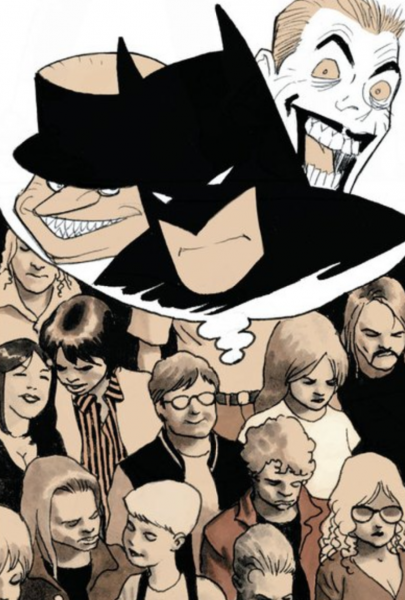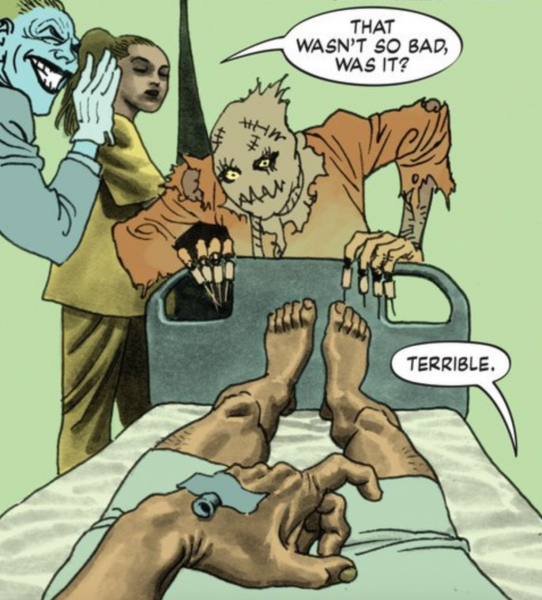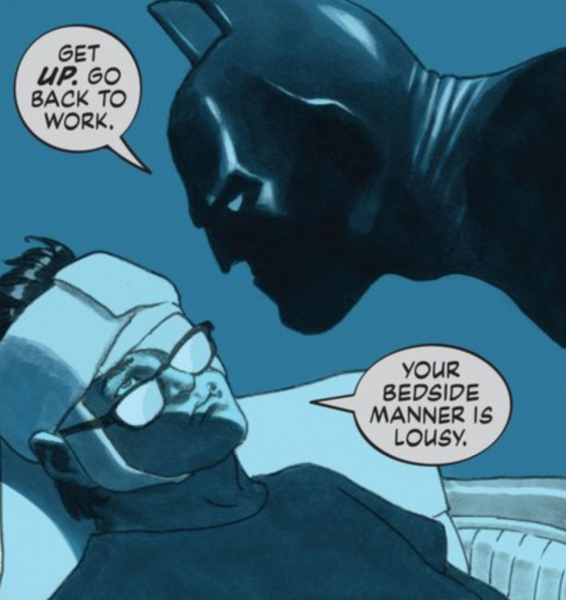Thoughts on Paul Dini’s Dark Night
Major parts of my formative years were shaped by Paul Dini. Obviously,
Batman: The Animated Series was as influential to me as it was to countless kids of that time, not to mention
Batman Beyond. It's strange how much of a connection you can feel to someone you've never met. A complete stranger.
I've read a few of his comics, a couple BTAS comics, his
World's Greatest Superheroes with Alex Ross, and I've always found an earnestness in the writing. It wasn't just a fan writing these stories, it was more, it was a
believer. A familiarity with the characters that was palpable.
That makes his latest book --
Dark Night -- a kind of origin story. We see what made these characters so large to Dini, why he sees them the way he does. The way
we see them. It's an intimate experience. As dramatic and personal as the best of Batman's stories. This, however, isn't a story about the Caped Crusader. It's a story about Paul. It's a story about us.
[caption id="attachment_85050" align="aligncenter" width="277"]
 Pictured: Us
Pictured: Us[/caption]
Paul Dini had a troubled childhood. Bullied, brutally shy, pressured by loving parents. Imagination, cartoons, comics, and most of all Batman was his escape. As he grew older and began working in animation, he struggled with many of the same issues. Relationships, work, his future. Here still, Batman was his escape. Things took a turn of the worse when, while walking home, Dini was attacked by muggers and beaten to a pulp.
What follows is an incredibly personal journey framed by the relationship of one man to the world of the Dark Knight. Dini's struggles with Batman, a man closer to the character than most, strangely mirrors my -- and other fan's -- relationship with Dini. For most of my life, he was a near-mythic figure. A guru on a universe I had spent most of my time in. Much like the Batman fantasy is tested for Dini, here that mythic writer is torn down before us, revealed to be
human. Flesh and blood.

This book was moving in a way I didn't really expect. I felt for Dini, as I thought I would, but there's a deeper level to it. As we see him grapple with his inner demons (personified as members of Batman's Rogues Gallery), we come to see the same kind of struggles have pervaded our lives.
This is a deep message that strikes such a cord with all of us. These characters are not haunting Dini, they're haunting
us.
That's why, I think, Batman works so well opposite these demons. Dini undergoes a crisis of faith of sorts. He stops believing in the idea of Batman. It becomes a silly power fantasy for him, childish escapism. Weirdly enough, I felt
bad for Dini. I'm not sure why exactly. It was as if he had lost his way. It seems so strange; I'd consider myself a fan of Batman, but not
fanatical. It's not exactly
spiritual or anything. Yet still, there was a tragedy to see someone so closely tied to my favorite version of Batman walk away from the character.
Slowly, as he heals, Dini grows to understand the real power of Batman. More than punching the poor and mentally ill in the face, Batman resonates with us because he stands up to those demons. He gets beaten down and comes right back. He's what we need to be, he's strong in the face of struggle. That's why Dini cares and that's why
we care too.
 The Dark Night
The Dark Night is what's best about the Batman mythos without being a Batman book. It humanizes Paul Dini in a way that somehow makes him grander. It's a look at both the legends, a deconstruction, and an examination of our relation to both. If you're a fan of Batman, his Animated Series, or Dini himself I
completely recommend this book.
 Pictured: Us[/caption]
Paul Dini had a troubled childhood. Bullied, brutally shy, pressured by loving parents. Imagination, cartoons, comics, and most of all Batman was his escape. As he grew older and began working in animation, he struggled with many of the same issues. Relationships, work, his future. Here still, Batman was his escape. Things took a turn of the worse when, while walking home, Dini was attacked by muggers and beaten to a pulp.
What follows is an incredibly personal journey framed by the relationship of one man to the world of the Dark Knight. Dini's struggles with Batman, a man closer to the character than most, strangely mirrors my -- and other fan's -- relationship with Dini. For most of my life, he was a near-mythic figure. A guru on a universe I had spent most of my time in. Much like the Batman fantasy is tested for Dini, here that mythic writer is torn down before us, revealed to be human. Flesh and blood.
Pictured: Us[/caption]
Paul Dini had a troubled childhood. Bullied, brutally shy, pressured by loving parents. Imagination, cartoons, comics, and most of all Batman was his escape. As he grew older and began working in animation, he struggled with many of the same issues. Relationships, work, his future. Here still, Batman was his escape. Things took a turn of the worse when, while walking home, Dini was attacked by muggers and beaten to a pulp.
What follows is an incredibly personal journey framed by the relationship of one man to the world of the Dark Knight. Dini's struggles with Batman, a man closer to the character than most, strangely mirrors my -- and other fan's -- relationship with Dini. For most of my life, he was a near-mythic figure. A guru on a universe I had spent most of my time in. Much like the Batman fantasy is tested for Dini, here that mythic writer is torn down before us, revealed to be human. Flesh and blood.
 This book was moving in a way I didn't really expect. I felt for Dini, as I thought I would, but there's a deeper level to it. As we see him grapple with his inner demons (personified as members of Batman's Rogues Gallery), we come to see the same kind of struggles have pervaded our lives. This is a deep message that strikes such a cord with all of us. These characters are not haunting Dini, they're haunting us.
That's why, I think, Batman works so well opposite these demons. Dini undergoes a crisis of faith of sorts. He stops believing in the idea of Batman. It becomes a silly power fantasy for him, childish escapism. Weirdly enough, I felt bad for Dini. I'm not sure why exactly. It was as if he had lost his way. It seems so strange; I'd consider myself a fan of Batman, but not fanatical. It's not exactly spiritual or anything. Yet still, there was a tragedy to see someone so closely tied to my favorite version of Batman walk away from the character.
Slowly, as he heals, Dini grows to understand the real power of Batman. More than punching the poor and mentally ill in the face, Batman resonates with us because he stands up to those demons. He gets beaten down and comes right back. He's what we need to be, he's strong in the face of struggle. That's why Dini cares and that's why we care too.
This book was moving in a way I didn't really expect. I felt for Dini, as I thought I would, but there's a deeper level to it. As we see him grapple with his inner demons (personified as members of Batman's Rogues Gallery), we come to see the same kind of struggles have pervaded our lives. This is a deep message that strikes such a cord with all of us. These characters are not haunting Dini, they're haunting us.
That's why, I think, Batman works so well opposite these demons. Dini undergoes a crisis of faith of sorts. He stops believing in the idea of Batman. It becomes a silly power fantasy for him, childish escapism. Weirdly enough, I felt bad for Dini. I'm not sure why exactly. It was as if he had lost his way. It seems so strange; I'd consider myself a fan of Batman, but not fanatical. It's not exactly spiritual or anything. Yet still, there was a tragedy to see someone so closely tied to my favorite version of Batman walk away from the character.
Slowly, as he heals, Dini grows to understand the real power of Batman. More than punching the poor and mentally ill in the face, Batman resonates with us because he stands up to those demons. He gets beaten down and comes right back. He's what we need to be, he's strong in the face of struggle. That's why Dini cares and that's why we care too.
 The Dark Night is what's best about the Batman mythos without being a Batman book. It humanizes Paul Dini in a way that somehow makes him grander. It's a look at both the legends, a deconstruction, and an examination of our relation to both. If you're a fan of Batman, his Animated Series, or Dini himself I completely recommend this book.
The Dark Night is what's best about the Batman mythos without being a Batman book. It humanizes Paul Dini in a way that somehow makes him grander. It's a look at both the legends, a deconstruction, and an examination of our relation to both. If you're a fan of Batman, his Animated Series, or Dini himself I completely recommend this book.